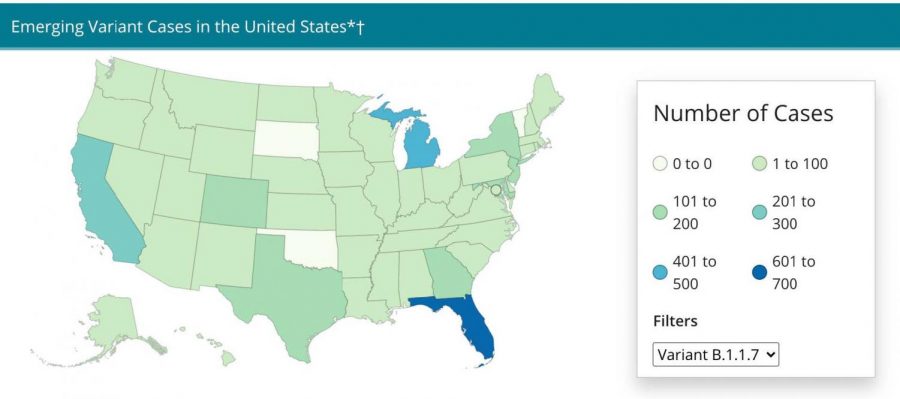COVID-19 variants spread to Washington
March 10, 2021
With the progression of the COVID-19 virus, new variants naturally develop with it. As of March 4, we know there are multiple variants found globally and in Washington state.
The three variants that are receiving the most attention from scientists are the variants B.1.1.7, first spotted in the United Kingdom, B.1.351, first spotted in South Africa, and P.1, first spotted in Brazil.
According to the Washington State Department of Health (DOH), “in January 2021, evidence of a potentially fast-spreading strain of the coronavirus known as B.1.1.7 was found in Washington state.”
The B.1.1.7 variant was originally found in the United Kingdom, and has been recorded by the Center of Disease Control (CDC) to have caused about 2,672 cases in at least 46 states as of March 4. Washington has attributed 39 cases to the variant so far. The CDC is worried that it may become a persistent and dominant strain across the U.S.
The CDC found that the variant spotted in South Africa, B.1.351, may pose reason for concern, since the mutation may cause vaccines to be less effective. According to them the B.1.351 seems to be “better at evading antibodies produced by the immune system.” Scientists have singled out the specific mutation that causes this, and are calling it E484K.
Because P.1, the variant first spotted in Brazil, also has the E484K mutation, scientists know that this variant can reinfect people who have already had COVID-19. It evades the body’s natural defenses similarly to the B.1.351 variant.
While those three variants have been the main focus of many science communications so far, there have been reports of other emerging variants. California and New York have been seeing two other variants, B.1.427 in California and B.1.526 in New York.
NPR reports B.1.427 “appears to be more contagious than the original strain but not as contagious as the variant first spotted in the United Kingdom. While researchers at the University of California, San Francisco, reported some evidence that it may make people sicker, that finding remains weak so far.”
The DOH said these variants remind us to use critical prevention measures to protect each other against COVID-19 and stop the spread. Common practices should remain the same, such as always wearing a well-fitting cloth mask around others, washing your hands often, avoiding indoor gatherings and signing up for Washington Exposure Notifications to alert you if you’ve been exposed to the virus.


